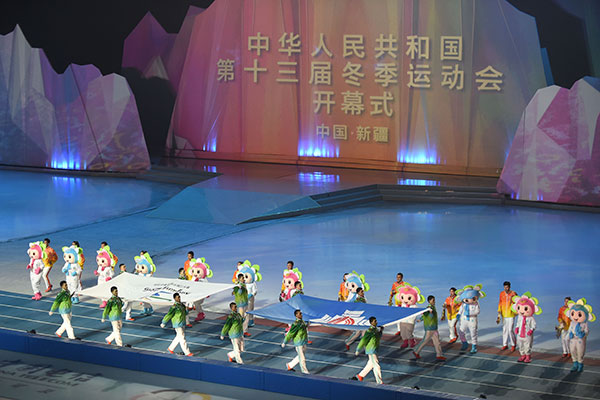
Vice-Premier Liu Yandong declares the opening of the 13th National Winter Games in Urumqi, capital of northwest China’s Xinjiang Uygur autonomous region, Jan 20, 2016. [Photo/Xinhua]
Vice-Premier Liu Yandong declared open the 13th National Winter Games of China at the Xinjiang Ice Sports Center on Jan 20.
China’s 13th National Winter Games, which are being hosted in the Xinjiang Uygur autonomous region from Jan 20 to Jan 30, will significantly help China promote winter sports in its western regions and achieve the goal of 300 million participants before the 2022 Beijing Winter Olympic Games, a top sports official said.

Volunteers march in with the flags at the opening ceremony for the 13th National Winter Games in Urumqi, capital of northwest China’s Xinjiang Uygur autonomous region, Jan 20, 2016. [Photo/Xinhua]
Previous National Winter Games, first introduced in 1959, were all hosted by Heilongjiang and Jilin provinces in the northeast, where winter sports have enjoyed huge popularity.
“Hosting the 13th National Winter Games in Xinjiang is a strategic move for China’s winter sports, which will be further promoted to western and southern China. It will also help China gain more experience in organizing winter sports events to prepare for the Beijing Winter Olympics,” Liu Peng, China’s sports minister, said at the ceremony.

The flame is lit by tightrope walker Adili Wuxor during the opening ceremony of the country’s 13th National Winter Games, which is held at the Xinjiang Ice Sports Center in Urumqi on Jan 20.[Photo/Xinhua]
In July, Beijing and co-host Zhangjiakou, Hebei province, won the right to host the 2022 Winter Games.
Liu said the National Winter Games is also a good opportunity to spot young talent to participate in the Olympics. More than 1,380 athletes from 54 provincial and municipal teams will compete for 97 gold medals in Xinjiang. Many events, such as figure stating and short-track speed skating, have divisions for young athletes.
Xinjiang’s favorable natural conditions for winter sports produced a lot of talent about 20 years ago, but because of a lack of training facilities, athletes gradually fell behind those in northeastern provinces, said Li Guangming, a top official of the Xinjiang Sports Bureau.

Spectators cheer for the opening ceremony of the 13th National Winter Games in Urumqi, capital of northwest China’s Xinjiang Uygur autonomous region, Jan 20, 2016.[Photo/Xinhua]
A new world-class ice complex in a southwestern suburb of Urumqi will be the venue for all ice-related events, including speed and figure skating, curling and hockey.
“We expected to see local Xinjiang athletes, especially those from ethnic groups who are naturally talented in sports, thrive after top winter sports infrastructure was in place,” said Gao Zhidan, deputy director of the organizing committee in Urumqi.
This is the first time Xinjiang will host a national sports event, and the organizer has “paid extra attention” to the security of the Games, according to Li Xuejun, another deputy director.

Athletes from Hong Kong, China, who participate the Winter Games for the first time, enter the stadium during the opening ceremony of the 13th National Winter Games in Urumqi, capital of northwest China’s Xinjiang Uygur autonomous region, Jan 20, 2016.[Photo/Xinhua]
